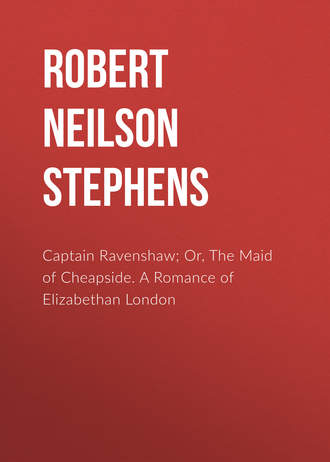 полная версия
полная версияCaptain Ravenshaw; Or, The Maid of Cheapside. A Romance of Elizabethan London
He stopped at a sudden parting of her lips; he looked around to see what alarmed her. There, coming from the house to the orchard, were Master Etheridge the goldsmith, Sir Peregrine Medway, and a ruddy, irascible-looking country gentleman.
"Plague take it!" muttered Uncle Bartlemy to Millicent; "this comes of not watching."
As Sir Peregrine was the embodiment of lagging weariness, and the goldsmith was himself well fagged, their companion was first within speaking distance. With scant greeting for the elderly couple, he turned fierce eyes on the scholar.
"How now?" he burst out. "Thou unthrift! thou ne'er-do-well! thou good-for-naught! Wouldst run away with my old friend's daughter? I'll teach thee, knave!"
But the captain stepped between the elder Holyday and the son, for he felt the quarrel to be his own, and saw his painfully reared structure of events ready to fall about him.
"Sir," he said, "he did it for your behoof; he marries to perpetuate your stock."
"Sir," replied Holyday the father, "I can attend to that myself. I am taking a wife next Thursday; my rascal son would not seek one when I bade him; so I sent him packing; but now he shall come home and be kept out of mischief."
The goldsmith, coming up, ignored his brother, bowed stiffly to the latter's wife, and stood before Millicent, his hands open as if he would fain clutch her.
"Thou baggage, thou'rt caught in time! Thou shalt not sleep till thou'rt tied in marriage to Sir Peregrine." He made to grasp her by the arm.
"Touch me not!" she cried, with a sudden thought. "You have no power over me; I am married!"
Her father stared. Master Holyday, taken by surprise, said, emphatically:
"Not to me, that I'll take oath; so I am a free man, of a surety!"
Ravenshaw could have struck him down. But Millicent, after one crestfallen moment, said, quietly:
"Not to Master Holyday, certainly; but to this gentleman." And she went to the captain's side.
There was a moment's general silence, during which Sir Peregrine, overcome by his long exertion, leaned limply against a tree.
"To this villain?" cried the goldsmith; "this cozener, this notable rascal, this tavern-cheat. 'Tis not possible; there hath not been time; not even for a license."
Millicent looked up at Ravenshaw's face, whereby he knew she desired him to take up the ruse.
"Sir," quoth he, "there hath been more time than you wot of; we have all been in the plot together for three days now."
"A pack of knaves!" shouted the goldsmith. "An there hath been a marriage, 'twill not hold. She was bound by pre-contract."
"'Tis not true," cried Millicent. "Sir Peregrine knows I would not receive his tokens."
"Oh, good lack!" quoth the old knight, faint of voice; "'tis all as well. I am glad your daughter hath released me, Master Etheridge. She is much inclined to jealousy, I see that; belike I should give her cause, too. I thank her for my liberty."
The goldsmith cast on the old knight a look of wrathful disgust, and walked precipitately from the place, breathing out plagues, murrains, and poxes. Sir Peregrine laboriously followed him. But Holyday's father dragged the scholar aside to talk with him privily.
Ravenshaw turned to Millicent. "The device served well. But the truth must out in time. Your father will have his revenge then."
"Alas, I have told a great falsehood," said she, braving her blushes. "I know not how to clear my soul of it – unless you – " She hesitated.
"I, mistress? What can I do?"
"Make it the truth," she faltered, dropping her eyes.
For a time he could not speak.
"Oh, mistress!" he said, at last, with unsteady voice; "would to God I might – But think you of my reputation."
"You will amend that; 'tis no great matter."
"I am no worthy mate for you."
"You have fought for me."
"You will learn to hate me again; you hated me but yesterday."
"'Twas because I had loved you the day before; else I should not have heeded."
"You are a world too good for me."
"Troth, I am not good in all eyes. Sir Peregrine is glad to be rid of me, and Master Holyday will not have me."
"I am penniless."
"My uncle hath said he would provide for me."
Ravenshaw looked at Uncle Bartlemy, who had been calming his wife's wonder. The old gentleman, with a fine attempt at hidden meaning, thus delivered himself:
"Sir, I owe you much upon the score of our first meeting – whereof you spoke awhile ago. If you can be content here in the country, with a wing of our poor house, while we live – 'twill all be Millicent's when we are buried – "
Ravenshaw felt her hand steal into his; he turned and took her gently in his arms.
Master Holyday, having come to an adjustment with his father, callously interrupted this embrace with the words, "Give me back my puppet-play now, and I'll wish you joy, and pardon all my calamities, even this dress."
Ravenshaw drew forth the manuscript from his doublet, saying: "If you return to your father's house, we are like to be your neighbours. And your friend Sir Nicholas shall earn a fee in spite of you."
"Troth, then, I'll write your nuptial hymn," said the poet, tenderly handling his puppet-play. "'Twill have a rare sound, – 'Epithalamium to the Beauteous Maid of Cheapside and the Roaring Captain.'"
"Nay, the roaring captain is no more," said Ravenshaw. "I am a gentleman again. Believe it, sweet."
"I care not what you are only that you are mine," quoth Millicent.
THE END
